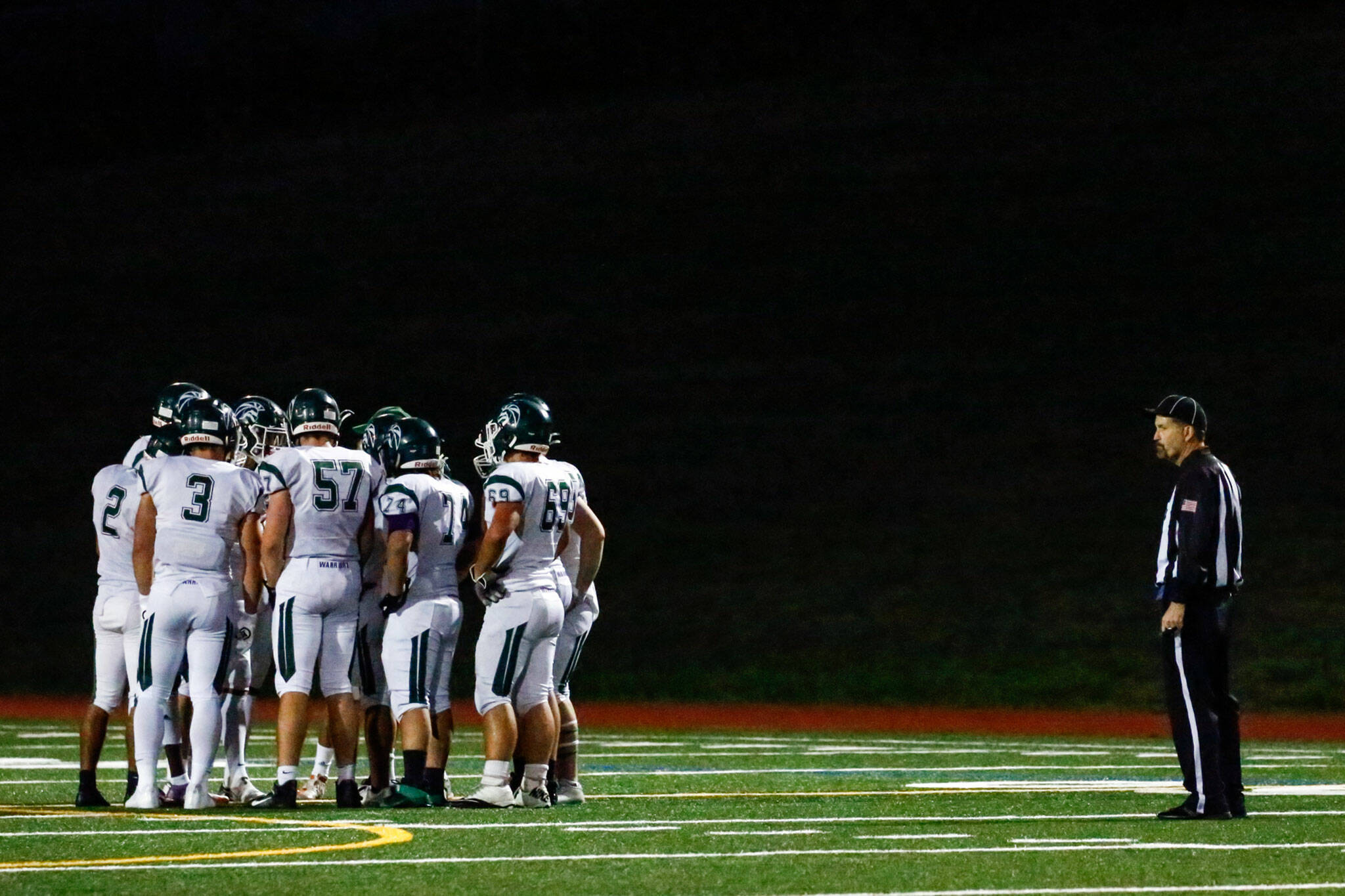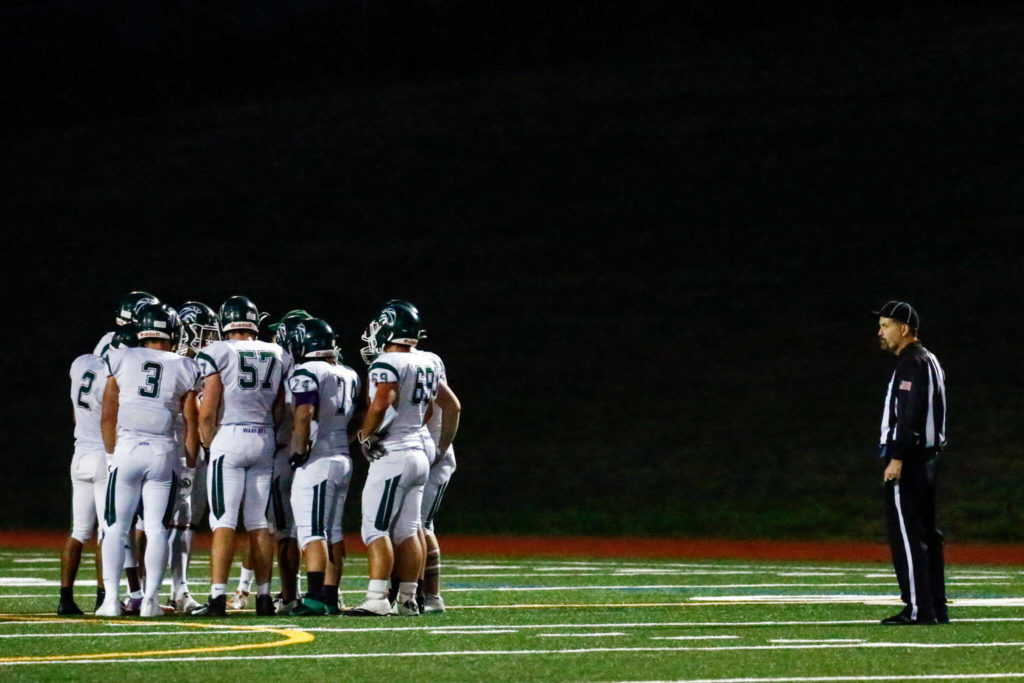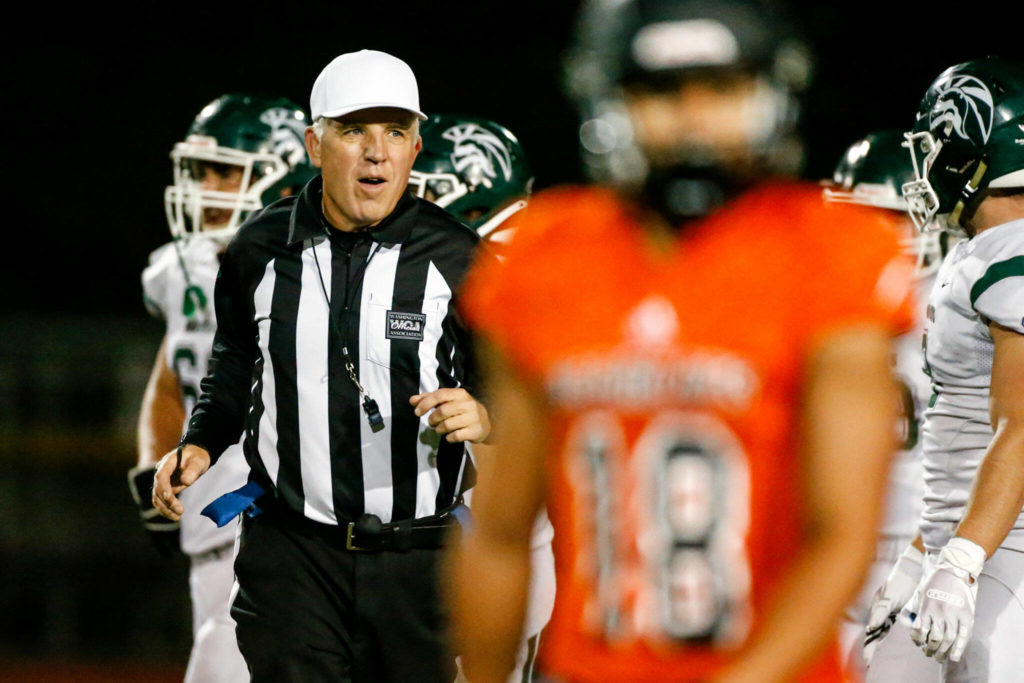For years now Snohomish County basketball official assignor Jeff Mattson has watched his roster of referees steadily dwindle.
As is the case with most youth sports officiating associations across the country, Mattson’s group of referees has seen some of its longtime members reach retirement age and hang up their whistles over the years. At the same time, it’s been a struggle to replace those bodies with fresh faces that stick around.
This past spring, things became dire.
High school sports in the state returned to play in late February, almost exactly a year after the coronavirus pandemic took hold of the world. When basketball started up in late March, suddenly Mattson’s roster of 119 officials in early 2020 shrunk to 50 over the course of a year.
“We got to the point at the end of the season where we didn’t have enough officials,” Mattson said. “And the officials we did have were working so many games that we’d start to lose them to injuries because they were working too much.”
“We had several games that were canceled at the freshmen level and the JV level,” he added.
Mattson, who is also a football and volleyball official, said many of his referees opted out of the shortened spring season due to concerns over COVID-19. With an average age of 53 years old, a considerable chunk of Snohomish County’s basketball officials are in an age group that’s at a higher risk of serious complications from the virus.
There were also basketball referees who work multiple sports that weren’t available due to seasons overlapping in the spring.
Mattson said he expects his numbers to partially recover this winter, estimating that about 40-50% of the basketball officials who opted out in the spring will return. But that number may not be enough.
“I know for basketball we’re really concerned because we don’t know if we’ll have enough officials for middle school games,” he said. “… Our priority as an association is to service the schools in our service area, but first priority is varsity then JV, freshman, eighth grade and seventh grade.
“All those kids work just as hard to play, but if we don’t have enough officials, then we have to start to prioritize what games we’re gonna cover, and that’s typically the varsity games.”
Mattson isn’t alone in his concerns. The official shortage isn’t unique to basketball — it’s a problem for all interscholastic sports.
“They’re all hurting,” said Dean Corcoran, president of the Washington Officials Association. “This isn’t even a local or statewide issue. This is a national issue, and it hits all sports. I don’t think there’s anyone that would say, ‘No. We’ve got plenty of officials.’”
Snohomish County football assignor Steve Jensen has seen his numbers decline as well. Jensen said that in 2019 he had 92 officials and the rare luxury of having enough referees that not all who were available on a Friday night had to work.
That number is now closer to 70 — with about 60 available on Fridays.
With the need of five officials per game, Jensen said 10 local games on Friday night is the ideal number for his crew to cover.
“You gotta remember there’s guys that will get hurt throughout the year,” he said. “There’s guys that have vacations. There’s guys that have anniversaries.”
There were 14 games in Snohomish County on Oct. 1, which resulted in Jensen giving two games to Whatcom County officials.
Jensen said he talks with Whatcom County football assignor Pete Lockhart daily to figure out how to make sure each county has its games covered.
“In the years past, I’ve never struggled to fill game assignments like I have this year,” Jensen said.
Borrowing from neighboring associations has become common in recent years.
Mattson said he borrowed from King County’s association two or three times during the 2019-20 season and every week during the spring season.
Jensen said he’s sent officials to help cover games in Chelan, Lynden and Olympia.
“For assigners, it’s like working magic sometimes,” Mattson said.
Borrowing officials from organizations has helped lessen the burden for assignors, but they’re also borrowing from associations that are facing their own problems.
Middle school football has been moved to the spring in Whatcom County due to lack of officials, Corcoran said.
Oct. 18’s vaccine mandate for most state workers, and on-site contractors and volunteers, has caused some concern in the officiating community as well. Sports officials — who are independent contractors — are included in the mandate.
In an interview with Clark County Today, Washington Interscholastic Activities Association executive director Mick Hoffman said the WIAA told the governor’s office that it anticipates a loss of 30% of officials due to the mandate.
“I can foresee losing some of our officials because of that, too,” Mattson said.
Corcoran said that he doesn’t expect the mandate to effect numbers that drastically, noting that most of that number includes officials who already aren’t working.
Referee numbers were already declining before the pandemic. Interactions between spectators and officials were a large catalyst. A survey of 17,487 officials by referee.com in 2020 showed that 57.02% of officials said sportsmanship at games was getting worse.
“I do a lot of the training for our group, and personally I tell the new people coming in, ‘If you’re doing this for the money, this is a horrible, horrible job,’” Corcoran said. “Because where else do you go to work where people just scream at you and tell you how horrible you are?”
“One of our favorite sayings is that it’s the only job where you’re expected to be perfect at the start and get better,” he added.
A shortage of officials can make those interactions more prevalent. When assignors are scrambling to cover games, referees with little experience get thrust into levels of play that they might not be prepared for.
In an ideal scenario, officials get a chance to get their feet wet at the middle school, freshman or junior varsity levels before working varsity games.
“I know there’s some associations where they have guys that aren’t very strong and they’re being put out on varsity games,” Jensen said. “That’s not very fair to the official, the crew or to the team. But we’re so short on officials that if we don’t send them out there there might not be a game.”
Both Corcoran and Mattson said when they started it could take years until an official would work a varsity game. Many first-year refs are now getting varsity action.
“It’s tough for a brand-new official who isn’t as sure and as confident in the rules,” Corcoran said. “They’re probably gonna make a couple mistakes, and people are just brutal about it. Part of it is just a comment on society in general. People have come to think that a ticket to the game is a right to abuse people. They forget that for the most part these are school settings. Athletics is part of the educational system.”
The job is also time consuming and commuting across Snohomish County for games in rush-hour traffic can be a pain. Corcoran said he takes Friday afternoons off from work during football season so he isn’t rushing to games.
Demand for officials is also expanding as Snohomish County continues to grow. The county has added three large high schools since 2008 and multiple middle schools.
So how can local officiating associations reverse their declining numbers and avoid further problems down the road?
The answer isn’t simple, but recruiting younger and more diverse members are some of the biggest keys.
Word of mouth has generally been the best tool for recruitment over the years, but Corcoran pointed out that it has its limitations.
“If I’m bringing in people like me, then you’re gonna end up with a bunch of old white guys,” Corcoran said. “And what we want is a younger, more diverse group because the community is becoming more diverse. For football and almost any sports, the officials are dominated by men. Getting more women involved and getting more minorities involved (is key) because that’s a whole other pool of potential officials that is largely untapped. So reaching out to those communities is important for the future.”
Mattson has been working with local athletic directors in an attempt to recruit new refs, whether it’s staff, parents or even students who are at least 16.
He said the plan would be to have those new officials work with veterans for mentorship.
“If you love sports, it’s great because you get the best seat in the house,” Mattson said of officiating. “And you’re getting paid to exercise and stay involved in the sport you love.”
A new pay system could also help attract younger recruits. Previously, refs weren’t paid for the games they worked until the end of the season.
“That might work for someone who is older and established in a career and isn’t really doing it for the money,” Mattson said.
Now they’re paid for each game within a few days.
“It’s a huge win for us,” Jensen said. “We just gotta get some people out there to do it and they’ll see the benefits.”
Local officials hope those and other efforts will help ward of a complete crisis.
“If you get into it and you like it, it’s a camaraderie that’s amazing,” Mattson said. “You start to build friends all across the officiating community.”
How to get involved
Anybody interested in becoming an official can visit woa-officials.com to submit their contact information, location and sport of interest. The Washington Officials Association will put applicants in direct contact with their local officials association.
Talk to us
> Give us your news tips.
> Send us a letter to the editor.
> More Herald contact information.



























